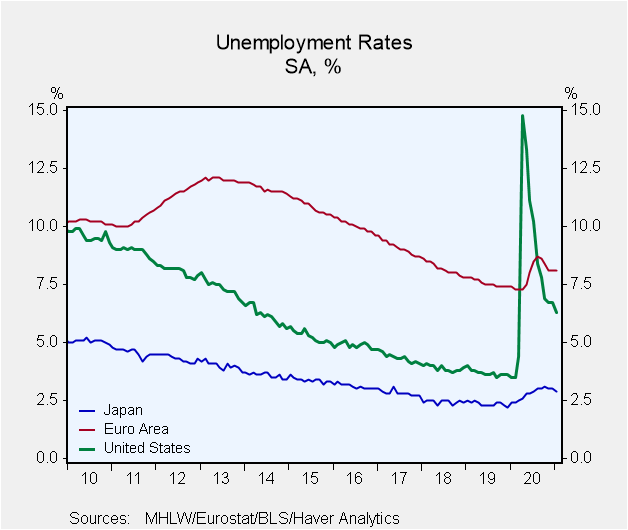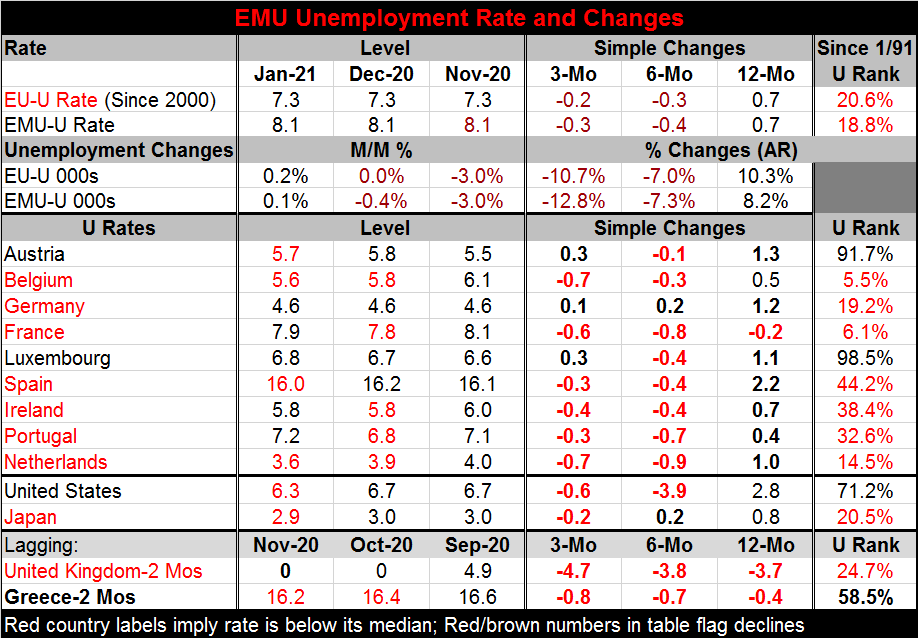 Global| Mar 04 2021
Global| Mar 04 2021EMU Unemployment Rate Steadies in January
Summary
The overall EMU unemployment rate was steady in January, off peak, but still elevated. In January of the early members, nine have reported unemployment rates for January. Of those nine, four of them have lower unemployment rates. [...]
 The overall EMU unemployment rate was steady in January, off peak, but still elevated. In January of the early members, nine have reported unemployment rates for January. Of those nine, four of them have lower unemployment rates. Three have higher rate and two are unchanged.
The overall EMU unemployment rate was steady in January, off peak, but still elevated. In January of the early members, nine have reported unemployment rates for January. Of those nine, four of them have lower unemployment rates. Three have higher rate and two are unchanged.
Higher unemployment rates are being experiences in France, Luxembourg and Portugal compared to a month-ago. Unemployment rates are lower in Austria, Belgium, Spain and the Netherlands.
Over three months, six EMU member unemployment rates are lower and only three are higher. Over six months, eight of nine unemployment rates are lower. But over 12 months since this is January - and 12-months takes us to a base just before the virus struck - unemployment rates are higher in eight of nine members.
Ranking unemployment rate levels (quite apart from changes in rates) shows that only two unemployment rates among EMU members are really historically high. Those are in Austria and Luxembourg. Five of the nine countries have unemployment rates residing in the lower one third of their historic queue of data.
Away from the EMU, the United States and Japan also saw their unemployment rates fall in January and both see unemployment rates lower on balance over three months. The U.S. rate is also much lower over six months while Japan’s rate is higher over six months. Both the U.S. and Japan have higher unemployment rates over 12 months (this compares rates today to a month just before the virus struck). Only France has an unemployment rate in January below its level of January 2020.

We can sum up the situation like this:
• The unemployment rate news is still encouraging as unemployment rates continue to move lower and already are mostly moderate-to-low on historic comparison even though they are not yet back to year-ago levels for the most part.
• As we see in the PMI data, there is ongoing improvement in manufacturing and slower more mixed progress in services.
• Lockdowns continue to interfere with recovery.
• In the EMU in January, retail sales volumes fell 5.9%, more than wiping out the monthly gain from December.
• The German construction sector has retreated sharply and shows contraction in January.
• The U.K. shows a plunge in car registrations in February. The U.K. has undergone ongoing economic interruptions because of actions taken to curtail the spread of Covid-19.
As vaccines take hold, we expect these impediments to growth to lessen and to become less frequent. There is a lot of hope that economies – all economies - are about to turn a corner and with it concern that inflation is going to ratchet up at the same time, despite ongoing reassuring comments from Federal Reserve officials, including such reassurances from Chair Jerome Powell today.
Robert Brusca
AuthorMore in Author Profile »Robert A. Brusca is Chief Economist of Fact and Opinion Economics, a consulting firm he founded in Manhattan. He has been an economist on Wall Street for over 25 years. He has visited central banking and large institutional clients in over 30 countries in his career as an economist. Mr. Brusca was a Divisional Research Chief at the Federal Reserve Bank of NY (Chief of the International Financial markets Division), a Fed Watcher at Irving Trust and Chief Economist at Nikko Securities International. He is widely quoted and appears in various media. Mr. Brusca holds an MA and Ph.D. in economics from Michigan State University and a BA in Economics from the University of Michigan. His research pursues his strong interests in non aligned policy economics as well as international economics. FAO Economics’ research targets investors to assist them in making better investment decisions in stocks, bonds and in a variety of international assets. The company does not manage money and has no conflicts in giving economic advice.






